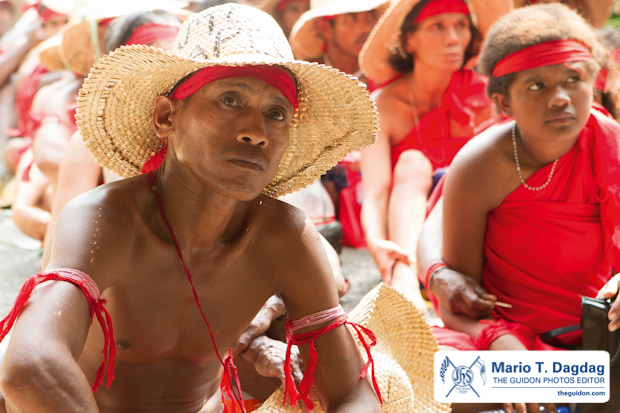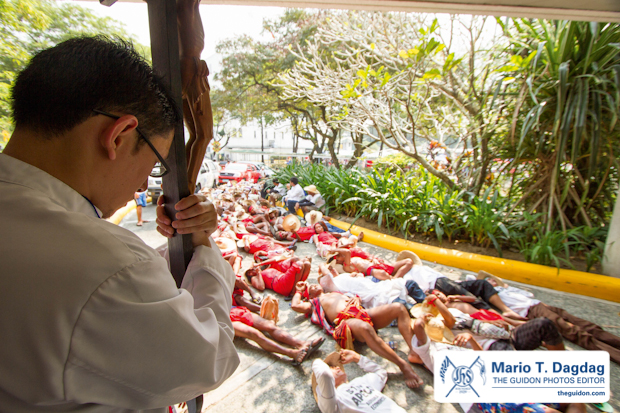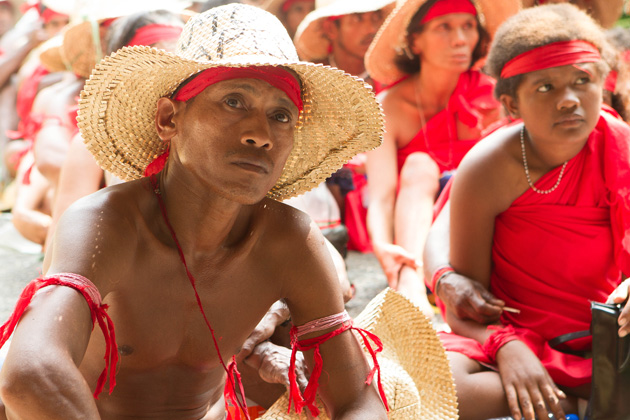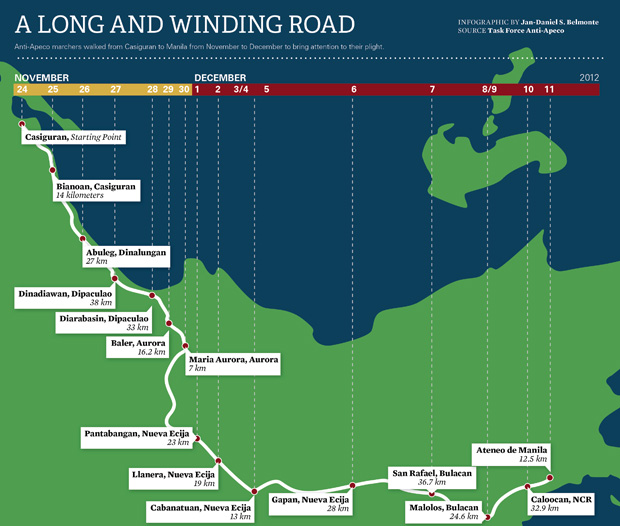
None for the meek. Indigenous groups are attached in a unique way to the lands they live in. Photo by Mario T. Dagdag
Over the past year, the Philippines has witnessed the fast-paced growth of its economy. It is a feat that has not been seen since the country’s economic glory days of the 1960s and 1950s—a period when the country was second only to Japan among Asian states in terms of economic strength.
2012 brought about significant gains in the Business Process Outsourcing industry, as well as an increase in the value of the Philippine Stock Exchange, which closed the year at 5,812.73 points. Likewise, it was also in 2012 that the Philippine peso emerged as the best performing Southeast Asian currency against the US dollar, going as high as P40.86.
Apart from the economic reforms and improved budget management initiated by the current administration, much of the success hailed by economists at home and abroad can be attributed to the country’s participation in the World Trade Organization (WTO). Formed in 1995 as a successor to the General Agreements on Tariffs and Trade, the WTO is a regulating organization that governs the rules of trade among its member states and bears a role similar to that of the United Nations. States that do not abide the rules and regulations of the WTO can be subject to economic sanctions.
An essential requirement for membership in the WTO is that the state adheres to a fiscal policy largely shaped in line with a laissez-faire economic philosophy. Such a philosophy revolves around a deregulation of the market and lower rates for taxes and tariffs.
Special Economic Zones
Closer to home, such free market-oriented practices can be observed through the government’s establishment of Special Economic Zones, which have their basis in the ratification of the Special Economic Zone Act (RA 7196) in 1995. Over 200 of such zones are scattered throughout the Philippines and all fall under the jurisdiction of the Philippine Economic Zone Authority.
Businesses that operate within the parameters of Special Economic Zones are granted a number of fiscal incentives by the government, such as the implementation of a 100% income tax holiday, a tax- and duty-free importation of equipment and parts for machines, and an exemption from wharf dues. Likewise, non-fiscal incentives are also provided: non-resident foreign nationals working for a business in the economic zones can be given special visas with multiple entry privileges. Businesses also benefit from simplified export and import procedures.
Nevertheless, as much as Special Economic Zones have been a boon to the country’s economy in a number of ways, in some instances, they have also been a bane to individuals who have been affected by the development of what used to be their lands. A strong case can be built around the argument that the government’s economic zone policy is, to a certain extent, biased towards business and profit at the expense of social welfare.
Fighting for the land
Around mid-2012, some members of the Ateneo community began a movement that sought to put a stop to the development of the Aurora Pacific Economic Zone and Freeport Authority (Apeco), which was formed through RA 9490 in 2007 and then amended by RA 10083 in 2010. This piece of legislation lapsed into law and was not signed by the president.
The law provides for the transformation of approximately 12,923 hectares of land into a hub for business and tourism. However, some residents of Casiguran, Aurora, where the economic zone is being built, believe that a bleak future lies in store for them with the further development of Apeco.
Although the Apeco administration explicitly states that the zone provides farmers, fisherfolk and indigenous people access to more jobs and higher income, those who are against the zone argue that its existence comes at the consequence of integrating such people into an economic system that, in the first place, already reinforces unequal power relations.
In a report by Task Force Anti-Apeco National Head Jerik Cruz (AB Eco-H ’09) and Ateneo alumnus Hansley Juliano (AB/MA PoS ’12), jointly published by the Roman Catholic Prelature of Infanta in cooperation with Fastenopfer (Swiss Catholic Lenten Fund) and Mensen met een Missie – Netherlands, the authors argue that “while it has been promised that the ecozone will spur job growth throughout Aurora, where the poor, less educated residents of Casiguran will fit in any employment, schemes generated remains elusive. The truth is that most of these residents are considered too unskilled for the industries that Apeco proposes to introduce.”
“Once dispossessed of their lands, waters, ancestral domains and other livelihood resources, they are in danger of becoming part of the country’s low-end, contractual ‘floating work force’—who have been repeatedly shown ‘not to benefit from government projects like the public-private partnership scheme,’” they add.
A number of social scientists from the Loyola Schools expressed similar sentiments in a statement released on December 16, 2012. Part of the statement reads, “We support the issues and demands raised by displaced farmers and indigenous peoples of Casiguran, Aurora. The case of Apeco highlights the violation of the principles of inclusive growth and development. It alienates the people who should be the first to participate and benefit from inclusive economic growth.”
Even the Loyola Schools Sanggunian has called for a stop to Apeco, stating, “Nation-building requires not just generating capital but also keeping in mind the particular needs of the constituencies the government represents on a local and national level; therefore structures that promote social inequality must be offset by accountable governance.”
Masaya, nagbibigayan, nagmamahalan at malaya
In a dialogue with President Benigno Aquino III last December 11, held at the San Jose Major Seminary Covered Courts in the Loyola Heights campus, Agta chieftain Vita Banayad explained how the life of her community changed after the entry of Apeco.
“Napakahirap na po ang aming buhay gawa ng pagsakop ng Apeco sa buong lupain ng mga katutubo… Dati po, doon kami masaya sa aming kabundukan, nabubuhay nang tahimik at malaya, nangunguha ng ikabubuhay. (Our lives have become extremely difficult due to Apeco’s seizure of the lands of the indigenous people. In the mountains, we used to live happy, peaceful and free lives, gathering for a living.)”
“Simple lang po ang buhay namin—masaya, nagbibigayan, nagmamahalan at malaya. Ito po ang pinakamasarap na buhay po namin. Nguni’t nang pumasok ang Apeco, nag-umpisa ang buhay namin na wala nang pagmamahalan, wala nang pagkakaisa dahil sinira ng Apeco. (Our lives are simple—happy, generous, loving and free. When Apeco came, we lost all the loving and all the unity.),” explains Agta tribesman Armand dela Cruz, referring to the disagreements that have occurred in his community in relation to Apeco.

A FIGHT FOR JUSTICE. Marchers from Casiguran lie down in protest of Apeco during their short stop at Miriam College last December 10, 2012. Photo by Mario T Dagdag
Something fishy
A number of individuals also find some actions of the Apeco administration dubious. In a press statement by the Task Force Anti-Apeco, it is said that “a total of P1.9873 billion has been allocated for Apeco in Congress’ General Appropriations Acts from 2008 until 2012. Senator Angara has affirmed that only P915 million, or less than 50%, of this allotted budget.”
“Apeco continues to be non-transparent in its budget disclosures. This non-transparency is indicative of how Apeco has failed basic governance standards of transparency, accountability, participation, and effectiveness more generally,” the group reported.
Cruz and Juliano report similar inconsistencies. “For all its pro-poor rhetoric, Apeco offers little on how it will negotiate these complexities in favor of the poor. While it claims that it will provide shelter for those who will be displaced by the ecozone, personnel of the National Housing Authority have subsequently revealed that the proposed housing units were of substandard quality.”
“While it claims that it will also provide livelihood projects, those who have already begun working for the SEZ (Special Economic Zones) have complained to anti-Apeco groups of inadequate compensation, irregular and unstable work hours, delayed paychecks and a near-complete absence of other benefits. They retain almost no bargaining power with their employers, and due to the unskilled nature of the work that they perform, are easily replaced should any conflicts between them and the management arise.”
Developing the margins
Those who are against Apeco believe that the residents of Casiguran stand at the losing end of the economic zone’s development plan.
As Luis Antonio Cardinal Tagle asked in his dialogue with the anti-Apeco Casiguran marchers last December 10 in the Ateneo, “Anong uring progress [ang itinataguyod ng Apeco]? Anong modelo ng katiwasayan ang gamit natin? Ito ba’y talagang sa bandang huli, itong ating nilulunok, ito ba ay katiwasayan at pag-unlad? O baka kapahamakan? (What kind of progress [does Apeco promote]? What model of economic security are we utilizing? In the end, does it lead to security and development? Or does it lead to harm?)”
In a press conference on the Apeco issue after the dialogue with Tagle, Commission on Human Rights Chair Etta Rosales argued that economic growth cannot be pursued at the expense of others.
“What is needed is a program of development, a sustainable development founded on human rights, based on the people’s needs and interests and the protection and conservation of natural resources.”








